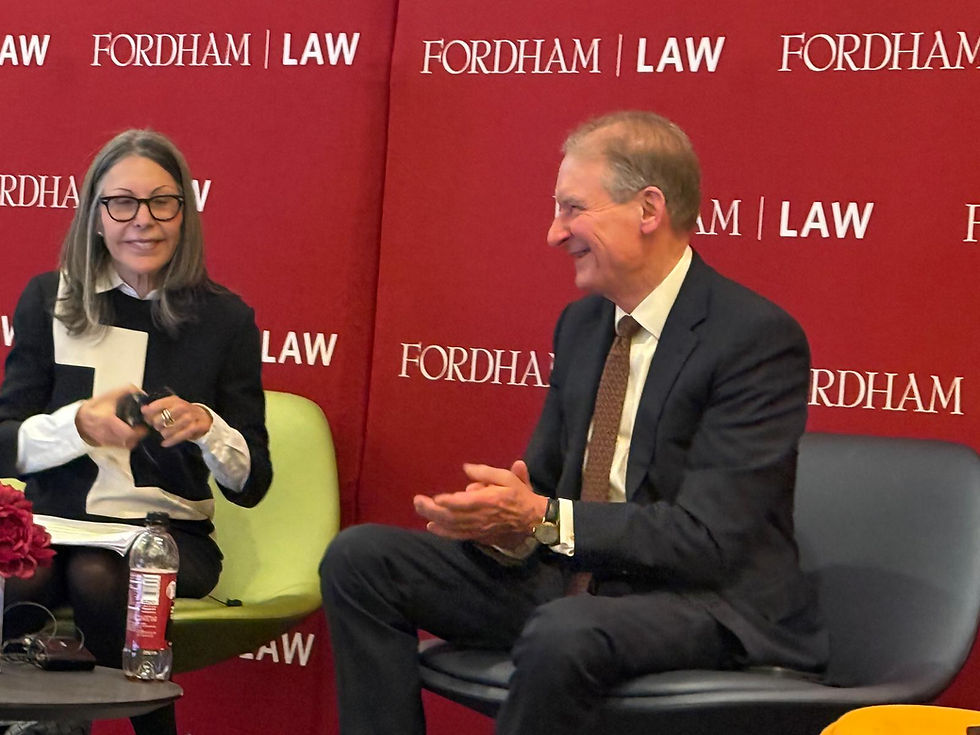Fordham reveals US forging ahead on crypto regulation
- Michael Bacina
- Oct 8, 2025
- 3 min read

The annual Fordham Blockchain Regulatory Symposium was convened at Fordham Law School in New York this week with the leading crypto lawyers in attendance. It has been a whirlwind 12 months for the crypto industry, particularly in the USA, as regulation by enforcement has given way to innovation supporting reform which promises to drive US financial markets forward.
The SEC Chairman, Paul Atkins, was in attendance and joined the convenor Donna Redel for a fireside chat. Earlier this year, the Chairman announced Project Crypto as the agency’s North Star to enable America’s financial markets to move on chain. Chairman Atkins’ keynote covered a wide range of initiatives that the SEC has embraced which promise to reset the way capital markets operate in the United States for generations. While Fordham is held under a strict 'chatham house rules' basis, for Chair Atkin's talk, those rules were lifted and all comments were 'on the record'. The Chair was frank at the US falling behind, saying:
I view the US as a decade, or perhaps 5 years, behind in trying to address distributed technology so we have to do double time marching to catch up.
Chairman Atkins has cast his plans to upgrade American financial markets as part of a broader digital evolution stretching back decades. A key priority for the SEC is to provide a pathway for entrepreneurs and software developers to develop ideas in the USA and use its capital markets to raise capital, rather than chasing them offshore.
We want to try and make people feel safe to do things in the US, in the past this wasn’t the case and we chased people offshore, they should be able to do things in the US and access our capital markets.
According to Chairman Atkins, the SEC’s important initiatives include:
Using ample existing authority to rule make to allow people to build and innovate in the United States;
Provide technical assistance to Congress as it progresses statutory reforms that will lay an enduring foundation to future proof policy reforms;
Seek harmonisation with the Commodity Futures Trade Commission (CFTC) by deploying joint rule making powers and closer collaboration with other agencies such as the IRS;
Reset the SEC’s approach to what it regards as an “Investment contract” based on what people are buying (a point reinforced this week by a decision of a California Court which found that Bored Ape NFTs are not securities, but more akin to art or collectibles);
Lay the regulatory foundations to allow SuperApps combining banking, securities, and commodities trading by the encouraging closer collaboration between regulators;
Make IPOs great again by making it more attractive to be a public company by tackling class action risk, revisiting disclosure exemptions and curbing the weaponisation of corporate governance;
Providing rules for an “Innovation exemption” to allow testing of innovative products which the SEC expects to share further details of by the end of the year; and
Regulatory guidance for tokenised securities to embrace the benefits of faster settlement and on chain compliance.
We’re not going to have the Wild West of course but we want to encourage experimentation.
While some in the financial services and crypto industries have clamoured for principles based rule making, Chairman Atkins believes detailed rules will be necessary:
Everyone wants principles based rules, but in the litigious environment of the United States, market participants want certainty…. In principle I like principles-based rules and we should strive for that in the crypto world.
Taken in combination, these policy reforms represent a broad reset of US financial markets policy to embrace innovation without leaving investor protection behind.
While the longevity of these reforms will depend fundamentally on legislative reforms from Congress, and continuing technological changes, the current SEC Chairman has outlined an agenda which could fundamentally change the infrastructure which underpins how Americans consume financial services with impacts far beyond its shores.
First published at www.BitsofBlocks.io and reproduced with permission.



